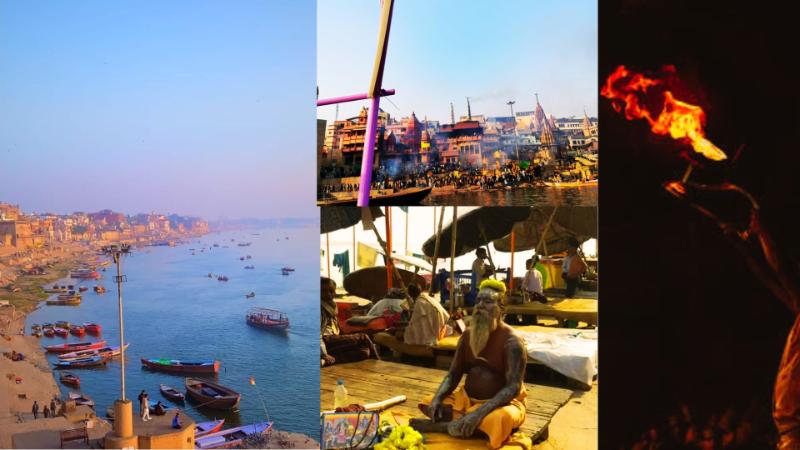- Date(s)
- May 21, 2025
- Location
- Queen’s University Belfast, Graduate School, First Floor, 01/025
- Time
- 15:00 - 17:00
- Price
- Free
Divine Currents, Earthly Dumps: Can the Ganga Survive as Both Goddess and River? Ethnographic Vignettes from Varanasi’s Riverfronts
The annual India Lecture, presented by the anthropologist Dr Sweta who works at the Mahatma Gandhi Central University, Bihar, India. Dr Sweta is our current Charles Wallace Fellow, and is based at the School of History, Anthropology, Philosophy and Politics (QUB) from April till the end of June. She is a specialist in Hinduism and water ecology and is currently working on a book about this topic. During her time in Belfast, she is also exploring water management and water-related legends and aesthetics in Ireland.
Abstract
The River Ganga, revered as a living goddess, and mother is relied upon by over 500 million people in India for livelihood and subsistence. It is at once a symbol of divine purity and also a site of ecological crisis. The anthropomorphic framing of the Ganga as a divine mother (Ganga Maiya) imbues her with human-like agency, shaping everyday rituals, ecological practices, and economic systems along her banks (ghats). This personification, rooted in Hindu scripture and historicity, homogenizes her identity as an eternal, all-giving entity, masking her material vulnerability and enabling cycles of exploitation.
This lecture explores the paradox at the heart of the Ganga’s identity: how a river so central to spiritual life in India has become one of the most polluted waterways in the world. Grounded in over a decade of ethnographic fieldwork in Varanasi, India, which is also designated a UNESCO ‘City of Living Heritage’, the talk reveals how sacred devotion, caste hierarchies, state-led beautification projects, and neoliberal urban reforms collide along the ghats-Ganga continuum (stepped riverfronts/portals to spiritual liberation), turning them into spaces of ritual, exclusion, and political spectacle.
At Varanasi’s ghats, 32,000 corpses are cremated annually, merging transcendent ritual with biochemical decay (BOD levels: 9.2 mg/L, thrice safe limits). Pilgrims bathe in Ganga laced with faecal coliform (50,000 MPN/100ml), yet proclaim, “Her soul is pure, even if her body is sullied.” Projects like the ₹900 crore Kashi Vishwanath Corridor and the multi-billion-dollar Namami Gange campaign are critically examined as examples of performative environmentalism, where cosmetic revivalism and heritage branding often sideline genuine ecological rehabilitation and displace vulnerable communities.
By weaving together ritual performances, caste politics, environmental data, and global case studies from the Whanganui River in New Zealand to the Nile and Amazon, this lecture situates the Ganga within a wider conversation about faith, power, and ecological justice. It challenges the UN’s ‘faith-based climate action’ framework, asking whether sacred rivers can truly survive the Anthropocene without addressing colonial-capitalist legacies and embracing plural, Indigenous, and subaltern epistemologies.
Through ethnographic vignettes, policy critiques, and visual narratives-glowing aartis, algal blooms, sacred chants, slogans like “Nirmal Ganga, Aviral Ganga” (Clean Ganga, Uninterrupted Ganga), the talk invites audiences to rethink water not just as a resource, but as a living entity entangled in cultural memory, inequality, and hope, sacred and science. The Ganga’s story is not India’s alone. From Brazil’s Amazon to Egypt’s Nile, sacred rivers are weaponized for ideological and economic gain, even as climate displacement accelerates. Ganga’s crisis is a global parable: a warning of how devotion can be co-opted into destruction, and a call to reimagine sustainability as an act of reciprocity between myth and materiality, power and ecology, the divine and the everyday.
Bio Note
Dr. Sweta is a founding faculty member in the Department of Sociology at Mahatma Gandhi Central University, Bihar, India and holds various administrative positions in the university. She earned her Ph.D. in Anthropology from the University of Delhi, supported by a UGC Research Fellowship, with a thesis titled “Riverfronts (Ghats) of Banaras: An Anthropological Study”. This work, examines the spatio-temporal evolution of Varanasi’s ghats and the river, interrogating intersections of myth, ecology, and subaltern agency. Her analysis of the dichotomy between ritual purity (pavitrata) and material cleanliness (swachhta) reframes debates on sacred sustainability in the Anthropocene. Her research has been published in internationally recognized journals such as India Quarterly, Teaching Anthropology, and Eastern Anthropology. She has shared her research at global conferences such as those organized by the International Union of Anthropological and Ethnological Sciences, the International Sociological Association, and the World Council of Anthropological Associations. She is also an active member of these international academic communities. Dr. Sweta combines her theatre background from Miranda House’s Anukriti group with socio-cultural critique, directing plays like Andher Nagri to explore power and marginalization. Currently, she investigates the Anthropocene’s impact on sacred landscapes, with a focus on water bodies, food systems, and cultural sustenance. Her work is driven by a profound curiosity for the overlooked textures of everyday life, unravelling how seemingly trivial practices shape collective identities and ecological futures.
Free registration for catering purposes (Lecture and Drinks): register here
| Website | https://www.qub.ac.uk/schools/happ/ |
